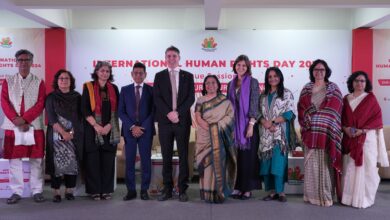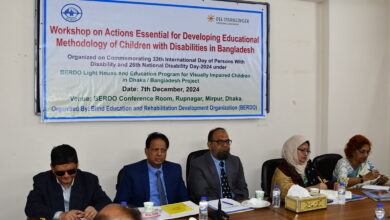Stable democracy helps Bangladesh pull ahead of India, Pakistan: Chicago Tribune

Bangladeshis are economically better off than ever before in history as its stable democracy and strong women leadership helped the country pull ahead of neighbouring India and Pakistan, prestigious US daily Chicago Tribune said in an article.
“Having a stable democracy, as well as strong women in the leadership positions has helped Bangladesh,” read the piece authored by Faisal Rahman, a professor of Saint Xavier University in Chicago.
He said investment in women’s education and high percentage of women’s participation in the labor force particularly helped Bangladesh pull ahead of India and Pakistan in per capita income and growth rate.
Rahman is also the founding dean of The Graham School of Management at Saint Xavier University while the US daily published his article as an opinionated editorial on April 18 last.
“Prime Minister Sheikh Hasina has proved to be a strong administrative leader in the mold of Malaysia’s Mahathir Mohamad and Singapore’s Lee Kuan Yew,” Prof Faisal observed.
Bangladesh is on its way to becoming a prosperous middle-income country proving that Kissinger was wrong in his assumption about its economic viability and sustainability, he said.
“In fact, Bangladesh is moving toward becoming the next Asian economic ‘tiger’.”
Bangladesh celebrated the 51st anniversary of its war of independence from Pakistan on March 26, he said, adding that the country was dismissed as a “bottomless basket,” or an endless charity case, by future Secretary of State Henry Kissinger, and the United States had supported the military dictators who had jailed elected representatives and started a war of terror to intimidate the population into silence and submission.
This is a perfect case of the contradiction between what the U.S. publicly stands for and its government behaving exactly in the opposite manner, he said.
When Bangladesh was born, it was in a terrible state and it was already one of the most densely populated countries in the world, the poorest by every economic indicator. Because of the war, economic infrastructure was in absolute ruins, he said, adding that it had no industrial base and no entrepreneurial class. Almost two-thirds of the country routinely went underwater during monsoon season.
To make things worse, the retreating Pakistan army gathered all the top intellectuals of the country two to three days before surrender and killed them. The only thing they could not destroy was the spirit of Bangladeshis, like what is being exhibited today by the valiant Ukrainian people, he observed.
Bangladeshis, albeit with the assistance of India, not only defeated the Pakistan army but also subsequently foiled repeated attempts to destroy its nascent democracy, he added.
Today’s Bangladesh is the second largest exporter of garments, not a small feat for a country that did not export a single garment at the time of its birth and with backward linkage, it is now one of the largest buyers of U.S. cotton and has a new diversified economy with a strong information technology service sector and a respected pharmaceutical industry and has become a preferred center for investment by economic giants such as China and South Korea, said Faisal Rahman.
“With U.S. and European countries experiencing vulnerability because of COVID-19 and fractured political relationships, the top two destinations of choice for multinational companies’ outsourcing are Vietnam and Bangladesh,” he said.
He said Bangladesh’s contribution to the world economy is more than selling inexpensive garments. Its laborers can now be found working in almost any country that will have them, he said, adding that among the immigrant labor, Bangladeshi workers are known for their industriousness, work ethic and ability to have a good relationship with people.
“These workers are the biggest contributors (other than the garment industry) of foreign exchange earnings,” he added.
He said Bangladesh has also shown how nongovernmental organizations can complement government efforts to accelerate development. BRAC, the largest nongovernment organization founded in Bangladesh by Abed, now serves more than 100 million people through its education, health care, youth and female empowerment programs in Asia and Africa.
The single biggest reason for Bangladesh pulling ahead of India and Pakistan in per capita income and growth rate can be directly attributed to its investment in women’s education and high percentage of women’s participation in the labor force, he said.
There are other areas where Bangladesh stands out among less developed countries, he said, adding that currently, Bangladesh is the largest contributor to United Nations peacekeeping missions in troubled parts of the world. Bangladesh has been sheltering 1.1 million Rohingya who have been forced out of Myanmar by the military government.
Unlike most other countries, Bangladesh has managed COVID-19 extremely well, he added.





